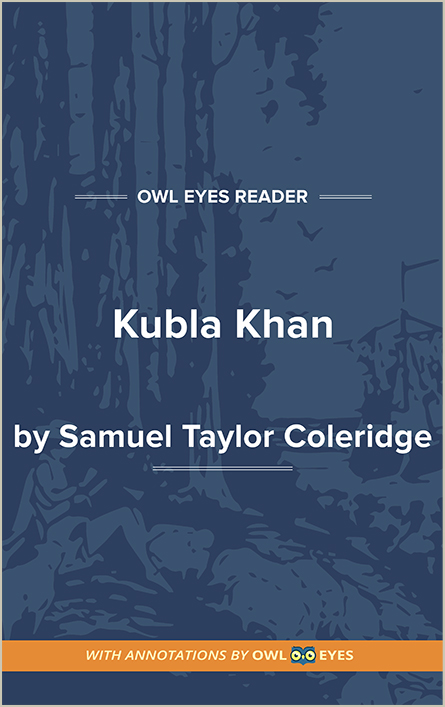Analysis Pages
Themes in Kubla Khan
The Imperfection of Creativity: In the subtitle, Coleridge announces that the poem is but “a Fragment.” The poem is thus, as a work of art, destined to be limited and flawed from the start, downsized or splintered in its actuality when compared to the perfection of its initial vision. This theme of creative endeavors degrading from inception to actuality plays out in two arenas: the poem itself is acknowledged from the start to be “a Fragment” and the imagery within the poem—namely that of the river running through the palace—symbolizes the process of creative imperfection.
The Artistic Imagination: The poem is interested in the source of artistic inspiration as much as it is interested in the inevitable imperfections of art. In the poem, Coleridge offers multiple images of inspiration. There is “the deep romantic chasm,” the wellspring of the sacred river which runs through Xanadu. There is, in the final stanza, the “Abyssinian maid” who sings to the dreaming speaker of distant Mount Abora. Finally, there is Coleridge’s testimony as to the inspiration of the poem itself, a combination of Samuel Purchas’s geographical accounts of Khan’s kingdom, the opiates with which the poet had treated himself, and, finally, the poet’s dreaming mind.
Themes Examples in Kubla Khan:
Kubla Khan
🔒"And drunk the milk of Paradise...." See in text (Kubla Khan)
"I would build that dome in air, That sunny dome! those caves of ice!..." See in text (Kubla Khan)
"A sunny pleasure-dome with caves of ice!..." See in text (Kubla Khan)
"chaffy grain beneath the thresher's flail:..." See in text (Kubla Khan)
"woman wailing for her demon-lover!..." See in text (Kubla Khan)
"deep romantic chasm..." See in text (Kubla Khan)
"A stately pleasure-dome decree:..." See in text (Kubla Khan)
"Kubla Khan..." See in text (Kubla Khan)
"Or, a vision in a dream. A fragment...." See in text (Kubla Khan)
"air..." See in text (Kubla Khan)

